- Home
- William Kennedy
The Ink Truck Page 13
The Ink Truck Read online
Page 13
Bailey left his aunt to her cooking and with Irma he went to see his uncle, only to find him still so engrossed with the bald man that he did not intrude. He wandered through the old house, so full of relics of the family history, and he yearned to know the secrets it might yield about his uncle and his other relatives whose lives had been lived in it. There was a picture of his Uncle Tim with a bicycle team, and Aunt Julia with a huge bosom and no waist at all; and a tintype of a man in a derby who was a relative beyond connection in this age. Even Melvin and Rose weren’t sure who he was. Maybe a great-great-grandfather. Maybe a grand-uncle. Maybe a train robber or a copperhead or a canal digger.
In the old living room all the furniture fabrics had been shredded by Potato Flake, and one entire wall was given over to a bookcase full of cat books, from the most arcane lore on the cat in antiquity to modern picture books on famous Hollywood cats. The collection made Bailey conscious of the money the old man could spend on luxuries while Rosenthal, poor bastard, was destitute. Must get him some money. He tugged Irma, and they went back toward the large pine-paneled room where the old man was talking.
The room was full of cat paraphernalia: a table full of rubber mice of assorted sizes and colors, some of them fur-bearing, some of them bell-tailed; flea-powder jars and boxes of catnip balls, a fish-scented plastic fish dangling from a wire, a scratching board, a round, full-sized lemon-colored bed (Potato Flake’s), a compartmentalized silver food dish, a silver-edged glass drinking bowl, a display case full of used ribbons, bells, collars, cat booties and angora sweaters that Potato Flake had worn; and on the walls huge photographs of Potato Flake scratching, eating, running, sleeping, slapping the pendulous fish and staring into the camera.
The captain, in black suit and string tie, was still talking with the same chubby, bald and bumpy-skulled man. Bailey saw the cat at last, sitting at the far end of the room in a stagelike frame with salmon-colored satin backdrops. Bailey deduced that it was a side-loading animal coffin that allowed Potato Flake (and would have allowed a Great Dane) to sit regally in death. The cat looked relaxed. One might have expected it to step down from its silken perch and bite a mouse, claw a fish.
“Hello, Cappy,” Bailey said to his uncle. “Sorry about the cat.”
“A sad day,” said the bald man, and he introduced himself as Mr. Toasty, a TV children’s-show emcee who, Bailey recalled, had a compassion for animals that was unrivaled in North America.
“Tears aren’t enough when you lose a pet,” Irma said, shifting her gaze from the coffin to the old man. The captain stared back at her.
“By the Jesus,” he said.
No one spoke, waiting for him to continue. But he didn’t go on.
“I’m very sorry,” Irma said. “We know how you must feel. It was a lovely animal.”
“A severe blow,” said Mr. Toasty.
“By the good goddamn Jesus mothers,” said the captain. He clenched his fist and screwed up his face.
“Who would poison such a pet?” Mr. Toasty asked. “Only an evil person.”
“I’ll get him,” the captain said. “By the beards of all shit-mongers, I’ll gibble his guts. Eeeeeeyyyyoooeeeooowww!”
He threw punches at the specter of his enemy. One, two, three and down. Then he kicked.
“Why don’t we begin the service?” Mr. Toasty said.
“The service?” said Bailey.
Mr. Toasty nodded and took the old man’s arm and led him to a seat at the center of a semicircle of chairs facing the coffin. He indicated chairs for Bailey and Irma and then went for Aunt Rose, who sat down, still in her apron. Mr. Toasty took a position to one side of the corpse.
“We see here the resting place of love,” he began with great solemnity. “The soul of this sweet animal has taken with it into the place where good cats rest, all the love a man can give to an animal on this earth. Just look at this room. Did ever a body see evidence of greater love? God loves a soft, little lamb. God loves a furry, white bunny rabbit with a pink nose. But I sometimes think that most of all, God loves a pussycat. When I go to sleep at night I my very self count cats as they leap after tiny little white mice. And then when they catch those mice they petty-pet-pet them, ever so gently, and then they let them go. Then I always reward those nice, kind kitties by dreaming of a big dish of chicken livers and lobster tails for each one of them. Such wonderful, wonderful creatures, I sometimes think they’re superior to human beings. I sometimes even go so far as to think that maybe, after all, God is a cat. Which of us could say different?”
A door slammed, and Bailey turned to see a large tiger cat swaggering across the room. It was half-bleached so that from midsection to tail it was splotchy white and from head to midsection the original gray-and-black mottle. Its tail had been recently cut to a nervous, scabby stump, its mouth was a malicious gap with teeth bared. Its back left leg was a wheel that spun as the other three legs moved, and its right ear was a green plastic thimble that twitched on its bloody ear stump as the cat advanced across the room on oily paws, leaving tracks.
Its irrational bravado and the depravity of its condition made it seem evil to Bailey, no matter how much a victim of others it unquestionably was, and he instantly knew its origin and the cause of Potato Flake’s death. Smith. No doubt about it. Smith. Exploiter of his own mother’s death. Inventor of the cow frame. Perverter of cats. Bailey leaped to the window and looked onto the porch for Smith or one of his cohorts, but saw no one. And when he turned back toward the cat he saw it advance toward Mr. Toasty and spring at his face. With an agility Bailey did not expect, Mr. Toasty veered to one side, grabbed a vase full of pussy willows from a stand beside the coffin and neatly clubbed the cat. The animal was stunned but recovered direction and came again at Mr. Toasty, who this time kicked it across the room, It arced past the Potato Flake photos, hit the wall and fell unconscious by the plastic fish. Mr. Toasty touched its carcass lightly with his toe, then leaned over and inspected its genital region.
“An unaltered animal,” he advised the mourners. “The worst kind.”
He picked it up by its stumpy tail and with its rear wheel spinning he carried it out of the room. Captain Melvin turned and spoke to his beloved Potato Flake.
“I’ll get that cat-kicking son of a bitch,” he told the corpse.
Bailey tried to talk to his uncle, but the old man would not listen. He was too concerned with carrying out his promise to the cat to be distracted; and when Mr. Toasty returned empty-handed, the old man was ready and went directly to him. He first rubbed the Toasty nose in a plate of Potato Flake’s two-day-old poo, retrieved from a kitty-litter basket; then he put a foot on the surprised animal lover’s chest and catapulted him across the room. Mr. Toasty rose with dignity, wiped his nose and left the house.
Winded, spent, the old man sat in his chair staring at the corpse of his cat. Bailey was saddened. Grief was grief no matter what caused it; and he felt strangeness too at what he was about to tell his uncle. He watched for evidence that they still had something in common, but he could not find the look that would admit they were kin. The old man looked at him as if he were a stranger, welcome in the house but not privy to anything beyond cordiality. Bailey saw some of himself in this kind of behavior: the ability to dispense with something that had once been almost vital. The friends who had been close before the strike, but failed to see in it the same virtues Bailey found, were all but forgotten. The strike had created something so callous in him that he often thought he would make no more relationships that would last beyond the moment. Ties would bind as long as the moment lasted: an instant, or perhaps a year but no longer. And he would not grieve when the moment ended. It was desirable to get beyond sentimental attachments, beyond trouble, beyond love, to be equal even to death. He would like to be able to talk to death if it entered the room, make intellectual chitchat, crack macabre jokes with it. He was not far from such liberation. His life now was almost like a sealed bottle that nothing could touch. He lived in great in
timacy with his dreams and his failures and he yearned for an end to emptiness but no longer expected one. He expected almost nothing from life but the next thing. And good or bad, it no longer seemed to matter. Rosenthal’s wife may be right, Bailey thought; maybe you are death.
“Listen,” Bailey said to the captain, “I know who killed your cat.”
The old man squinted at him.
“And it wasn’t one of your neighbors,” Bailey said.
The old man sat up straight. Bailey talked then, nonstop. He explained who Smith was, that his name was really Seventh Elevator and that he was a gypsy. He explained the gypsy presence and its role in the strike. He explained the fire (without implicating himself) and Putzina’s death and the vengeance Smith was taking on Guildsmen. He told the old man how Smith and the gypsies had kidnapped and tortured and cursed him, and how a kid named Skin tried to make an arhat out of him. He skipped Miss Blue, since Irma was already bottle-eyed listening to the story. He did not dwell on anything until he came to Rosenthal and then he explained with painstaking detail the total destruction of Rosenthal’s home and the hours it took merely to make it barely habitable again. Finally he made his point: a request for two thousand dollars that would help Rosenthal get started again. He came back to the cat and vowed he would take his own vengeance on Smith for all that had been done, including the murder of the cat and the thrusting of the corrupted animal into the midst of the funeral ceremony. When he finished he thought of how little the old man really knew of the Guild and he backtracked and talked of Rosenthal’s commitment and of Irma’s role, and of himself and of the others who didn’t last so long, and of the year-long loyalty to a cause that provided a common bond to its adherents, a deep kind of brotherhood. Rosenthal, he told the old man, is one of the gentlest souls on earth, a lionheart, the worthiest man he knew.
Uncle Melvin nodded his head and stroked his whiskers. When Bailey finished he looked him in the eye for a few silent seconds, then stood up and motioned for Bailey to follow. He went to the living room and rummaged in his roll-top desk for an envelope and told Bailey to wait. Bailey sat at the desk while the old man went upstairs. To his hoard, Bailey assumed. Then he was back, and dropped the envelope in Bailey’s lap. He said only: “You ain’t very smooth.”
Bailey opened the envelope and found two sheets of sandpaper.
“Are you leaving?” Aunt Rose asked Bailey.
“I think it’s time.”
“At least help him with the coffin. If you don’t he’ll probably give himself another hernia.”
Bailey agreed to stay, and Rose relayed the information to her brother, who was already fussing with the coffin. Bailey helped him close it, and together they carried it to the old man’s station wagon and slid it gently in through the tailgate. The old man climbed in beside it and sat down with his hand holding it steady.
“You drive,” he told Bailey.
Irma and Rose got in and Bailey drove to the pet cemetery, guided by his uncle’s directions. A guide at the cemetery office took them over a snowy road to the burial area and directed them to an open grave, one of many dug in the fall, and covered with tarpaulin and manufactured sod to await winter usage. The guide tried to help Bailey unload the coffin, but the old man pushed him away and with Bailey carried it to the grave. The guide pulled up the tarpaulin and kicked the ice and snow off it. Bailey and the old man knelt in the snow and lowered the coffin into the grave. Then, while the others watched, wondering what was next, the old man stood up and doffed his captain’s cap and held it over his heart. He looked at everyone, demanding an absolute silence. And then he began to mumble his threnody, taking it beyond grief, beyond prayer:
By the hair and fat
from a phantom cat,
by the death and pains
of Siamese brains,
I swear to Bast
I’ll live the last
to pum the drum
and skewer the one
who pized the bell
of the catsy sun,
who stole the sky
and dried the pool
and took the old man
for a fool.
Be-elzie zott bezumm bezoo.
O cat of mine,
O cat o’nine,
Be-elzie zott bezumm bezoo.
He fell to his knees and cried. The guide covered the grave with the tarpaulin and rolled the manufactured grass on top of it. Rose and Irma helped the old man to his feet and led him weeping to the station wagon. Bailey drove. They were halfway home when the captain spoke the first word of the ride.
“Gypsies?” he said. “Gypsies? Did you mean any of that?”
“They’ve poisoned their enemies’ animals for centuries,” Bailey said. “They even used to use a special kind of poison called drao that just might be traceable.”
“Hard right rudder,” the old man said. “We’ll have an autopsy.”
Bailey turned the car around and drove back to the cemetery. He and the old man walked to the grave and stared down at it in disbelief. It was a raw wound, the tarpaulin and grass pulled back and the coffin obscenely smashed, and empty. The old man stiffened, then spoke to the wind with clenched teeth, pounding his hand with measured strokes of his fist.
“By the balls of dirty Judas, I’ll pay a fortune to get the fiends who did this.”
Even as he spoke, Bailey was in motion, leaping among the tombstones incribed to “Fido” and “Faithful Tippie” and “Tabby the Third.” At the crest of the hill he looked in all directions but saw no one. Then, moving at a great gallop and with green muffler flying, he came down the hill, suffused with the vision of banishing the old man’s grief and restoring Rosenthal’s life in one swooping gesture. He grabbed his uncle’s arm and stowed him in the station wagon, where Irma waited with bewildered look. Then he leaped behind the wheel and with a frenzied gun of the motor he roared off into a brand-new possibility.
Smith was gone. The gypsies were gone from behind the burned building. Bailey’s income from the Guild benefits was gone. Bailey’s apartment, abandoned by Grace when she went to her mother, was gone. And for Bailey the Guild was gone too.
Solve the riddle or die was the ultimatum he had always lived under. And as he worked to solve the riddle, he also prepared to die. But he never conceived that the riddle would be taken from him.
He rented a room-and-a-half apartment and paid a month in advance out of a diminishing bank account. He called friends he hadn’t talked to in a year or more. He asked them to help him find work.
His inability to help Rosenthal and his Uncle Melvin drove him ever deeper into the gloom of guilt.
(Bailey, halt!)
(One, two.)
PIGS ARE WHERE YOU FIND THEM, OUTLAW DECIDES
SOUL IS A PORK CHOP, HE DISCOVERS
Within the soul, within the body social, there must be—if we are to experience long survival—a continuous “recurrence of birth” (palingenesia) to nullify the unremitting recurrences of death. For it is by means of our own victories, if we are not regenerated, that the work of Nemesis is wrought: doom breaks from the shell of our very virtue. Peace then is a snare; war is a snare; change is a snare; permanence is a snare. When our day is come for the victory of death, death closes in; there is nothing we can do, except be crucified—and resurrected; dismembered totally, and then reborn.
—JOSEPH CAMPBELL
The Hero with a Thousand Faces
He took a job in the State Library, menial work sorting and shelving books. On his first workday the head librarian gave him instructions and presented him with a wallet-sized copy of the library’s essential dogma:
A book improperly shelved is a lost book. A lost book might just as well not have been written. Worse, it is a promise unkept to users of the library, for it exists in our card catalog, but only as a man exists through having his name on a tombstone. Do not bury books. Shelve them properly.
Bailey stepped into the stacks elevator and began his descent. Down he wen
t into the earth, one of the city’s deepest points. He drew a breath of the dry air that filled the elevator cage and at bottom level stepped out into the burial vaults of the past. He was in a long concrete corridor with green metal racks everywhere. Small bulbs lighted the aisles near the elevators and illuminated the beginnings of dark passageways among the dusty shelves of knowledge.
A wagonload of books awaited him, as the librarian had promised; also a stack of bound volumes of old newspapers. These, more than anything else, aroused his curiosity, both from a professional viewpoint and because he felt he might trace something of himself through those old years. He shelved the books, then noted down stories that beguiled him from the old papers: Costigan’s brass tools stolen from his shop; Alderman Wingate gives two-hour declamation on the anniversary of our independence; Miss Lavinia McQuade found at old Ale House with more young men acting as gallants than befits a young lady of prudent conduct; Lanahan rolls off roof and is believed to have sunstroke but is only drunk; squad of stragglers returns from war after hiding in mountains for one year after Appomattox.
He constructed personal equations out of brass tools, independence talk, gang bangs, drunkenness, blind allegiance to a dead cause. He felt he could take them all to heart. And his perusal of the crumbling old papers told him he could find a thousand more items like them and equate them too, proving that he was all the world, all the world was he. But he knew no more about himself than he did before he began.
Irma gained access to the stacks on the pretext of researching a thesis on immigrant stupidities from 1800 to 1850 and reported that Guild locals around the country, and also the liberal wing at International Guild headquarters, were calling Bailey, Rosenthal and Deek the Ink Truck Heroes. This was unofficial banter. The official line was to deplore what they did. Popkin and Jarvis had quickly rejected Deek’s application for Guild membership on grounds of ineligibility, but Rosenthal forwarded it to Guild headquarters, suggesting honorary membership.

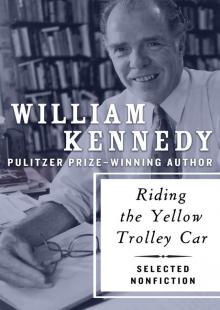 Riding the Yellow Trolley Car: Selected Nonfiction
Riding the Yellow Trolley Car: Selected Nonfiction Changó's Beads and Two-Tone Shoes
Changó's Beads and Two-Tone Shoes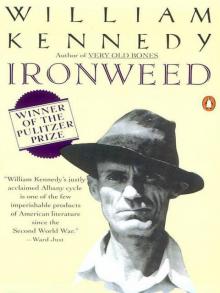 Ironweed
Ironweed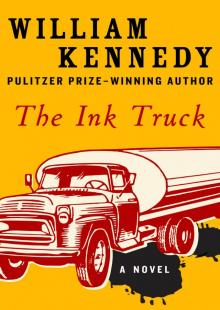 The Ink Truck
The Ink Truck Billy Phelan's Greatest Game
Billy Phelan's Greatest Game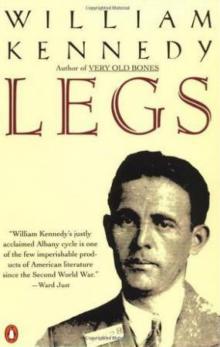 Legs
Legs Very Old Bones
Very Old Bones The Last Mission
The Last Mission The Flaming Corsage
The Flaming Corsage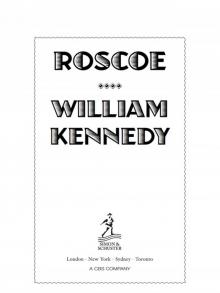 Roscoe
Roscoe Quinn's Book
Quinn's Book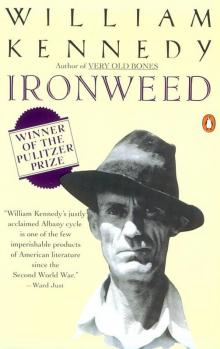 Ironweed (1984 Pulitzer Prize)
Ironweed (1984 Pulitzer Prize)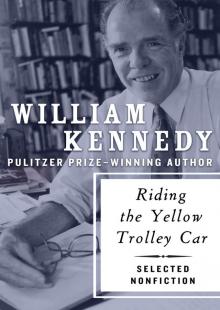 Riding the Yellow Trolley Car
Riding the Yellow Trolley Car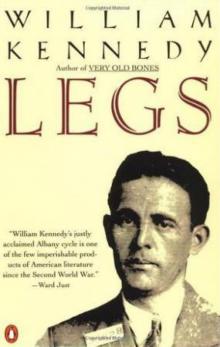 Legs - William Kennedy
Legs - William Kennedy